Part of being an Iranian or an Iranian-American is
facing the dreaded "dilemma". You know the one.
You dare not give your heart to America because you feel
in doing so you will somehow betray your love for Iran.
Even though she may have spurned you for the past 20 years,
just like an obsessive one sided love affair, try as you
might you can't give her up. You know you need to move
on, but you can't.
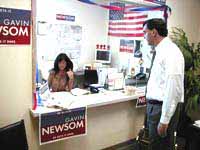 This
dilemma has kept many of my generation from actively
participating in the American political process. Having
gone through the 80's and the hostage crisis, we were
justifiably scared away from anything that would bring
up that ugly chapter of our history. We strived to keep
the topic of the discussions with our American friends
away from anything to do with Iran, if we had any American
friends at all. We kept neighbors at a distance, and
retreated to the comfort of Iranian restaurants for lunch
on Fridays where we could forget, for a brief moment. This
dilemma has kept many of my generation from actively
participating in the American political process. Having
gone through the 80's and the hostage crisis, we were
justifiably scared away from anything that would bring
up that ugly chapter of our history. We strived to keep
the topic of the discussions with our American friends
away from anything to do with Iran, if we had any American
friends at all. We kept neighbors at a distance, and
retreated to the comfort of Iranian restaurants for lunch
on Fridays where we could forget, for a brief moment.
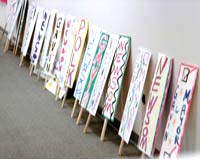 But
things are starting to change. After 9/11 we have become
more vocal. We're starting to come out of our collective
shells, the discussions are getting more heated and we
are engaging our American friends more as they start
to "get it". Now state and local senators
are taking more meetings with Iranian advocacy groups
that are popping up on both coasts. But
things are starting to change. After 9/11 we have become
more vocal. We're starting to come out of our collective
shells, the discussions are getting more heated and we
are engaging our American friends more as they start
to "get it". Now state and local senators
are taking more meetings with Iranian advocacy groups
that are popping up on both coasts.
Another reason we are more vocal is through our increased
exposure to a fresh generation of young and highly intelligent,
skilled and street-smart Iranian-Americans who are free
of the "dilemma", having been born and grown
up outside of Iran. They are inherently more comfortable
with the system, and embrace the opportunities before
them with a hunger and enthusiasm that is nothing short
of inspiring. The benefits of having parents who focused
their energies on material success has allowed them the
privilege to get some of the best education available
and now they are ready to put it to use.
 Case
in point, in this year's San Francisco mayor's race,
the leading candidate Supervisor Gavin Newsom who is
running an unbelievably successful campaign (dast-be
choob! trans; touch wood) has not one, but 2 Iranian
staffers. Ahsha-Ali Safai, and Baha (Bahador) Hariri,
as you will read, are two of the brightest stars, well-equipped
and outfitted, ready and willing to take on the challenges
the future will likely try to throw at them. They are
definitely two to watch. I recently met them at the Newsom
campaign headquarters in downtown San Francisco. Case
in point, in this year's San Francisco mayor's race,
the leading candidate Supervisor Gavin Newsom who is
running an unbelievably successful campaign (dast-be
choob! trans; touch wood) has not one, but 2 Iranian
staffers. Ahsha-Ali Safai, and Baha (Bahador) Hariri,
as you will read, are two of the brightest stars, well-equipped
and outfitted, ready and willing to take on the challenges
the future will likely try to throw at them. They are
definitely two to watch. I recently met them at the Newsom
campaign headquarters in downtown San Francisco.
I would like to give special thanks to John Shanley
the Press Director for the Newsom Campaign who so graciously
provided me with a complete office tour and explained
the processes of the campaign with such care and detail.
It's always wonderful to meet someone so professional.
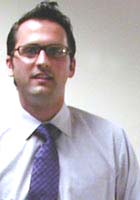 A
bit of background on Ahsha. Born in Iran in 1973 he is
an American Citizen and has been involved with politics
since age 18. He looks, walks, talks and is every bit reminiscent
of a hipper, cooler George Stephanopolis. Except he is
better looking (because he is Iranian!). During college
at Northeastern he worked in Massachusetts politics at
the city and state level, establishing many mentor level
contacts with big name politicians such as former presidential
candidate Dukakis. In 1995 after completing his undergrad
he went to work in the Clinton White House. When that term
was complete he went back to college, this time to MIT,
where he received his masters in Urban Studies and City
Planning. A
bit of background on Ahsha. Born in Iran in 1973 he is
an American Citizen and has been involved with politics
since age 18. He looks, walks, talks and is every bit reminiscent
of a hipper, cooler George Stephanopolis. Except he is
better looking (because he is Iranian!). During college
at Northeastern he worked in Massachusetts politics at
the city and state level, establishing many mentor level
contacts with big name politicians such as former presidential
candidate Dukakis. In 1995 after completing his undergrad
he went to work in the Clinton White House. When that term
was complete he went back to college, this time to MIT,
where he received his masters in Urban Studies and City
Planning.
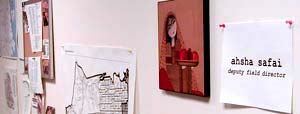 In
2000 he moved to San Francisco and immediately went to
work for the Housing Authority. His function, unclog proposals
and budget approvals and laws that were stuck in the system.
Basically a swiss army knife. Find out why something is
stuck, and go get it fixed. This involved frequent meetings
with city council members and supervisors in order to advocate
and educate and explain the benefits and reasons why an
initiative was good and why they should pass it and get
it going. In
2000 he moved to San Francisco and immediately went to
work for the Housing Authority. His function, unclog proposals
and budget approvals and laws that were stuck in the system.
Basically a swiss army knife. Find out why something is
stuck, and go get it fixed. This involved frequent meetings
with city council members and supervisors in order to advocate
and educate and explain the benefits and reasons why an
initiative was good and why they should pass it and get
it going.
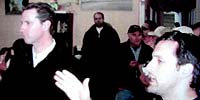 It
was through this job that he met with and grew to respect
Gavin Newsom. When it became clear that Newsom was going
to run for Mayor, Ahsha joined the campaign as Deputy Field
Director. This function essentially mobilizes the supporters
for the candidate and coordinates activities in order to
maximize exposure, and help the candidate meet and interact
with as many people as possible. It
was through this job that he met with and grew to respect
Gavin Newsom. When it became clear that Newsom was going
to run for Mayor, Ahsha joined the campaign as Deputy Field
Director. This function essentially mobilizes the supporters
for the candidate and coordinates activities in order to
maximize exposure, and help the candidate meet and interact
with as many people as possible.
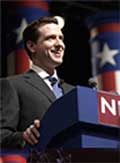 Gavin
Newsom is somewhat of an enigma himself. He has come from
the best San Francisco has to offer. A local restaurant
and wine businessman, he has a well qualified awareness
of both the internal needs of the city as well as the important
image San Francisco has, as one of the top ranked cities
in the world. However, San Francisco has it's fair share
of problems that you can tell Newsom intends to tackle
with energy. Gavin
Newsom is somewhat of an enigma himself. He has come from
the best San Francisco has to offer. A local restaurant
and wine businessman, he has a well qualified awareness
of both the internal needs of the city as well as the important
image San Francisco has, as one of the top ranked cities
in the world. However, San Francisco has it's fair share
of problems that you can tell Newsom intends to tackle
with energy.
The first and many would say biggest issue, is the increasingly
obvious homeless that traverse the streets. There doesn't
seem to be any solution to the number of beggars and panhandlers
in the best parts of the city. Frequent screaming and defecation
is a constant eyesore to tourists, city dwellers and workers,
who pretend to ignore it, and nothing seems to make it
to implementation. Suggestions and solutions to the problem
go unheard and it is getting worse.
When I was working in the city for 4 years during
the dotcom boom (and eventual bust), fed up with stepping
over no less than 8 homeless people on my way home each
night, I sent in a simple plan that suggested that using
a consensus team of conscientious volunteers, from shelters
and drug and mental illness programs, residents, police,
the bus system, high school and college students and
even the national guard, it was realistically possible
to sweep through the relatively small geography of San
Francisco in 24 hours, document everyone who was obviously
homeless, and place them into one of 3 categories and
move them into programs to address their needs. Based
on my years in the city, my daily exposure and observation
of the problem was simple. If you are truly homeless
you needed to get to a shelter. If you were mentally
ill or addicted you needed too get to a facility. If
you were a criminal you needed to be arrested.
 Newsom
however, looks to have the best chance to solve this and
other city problems, and you can tell it is an important
agenda item under his "CARE Not Cash" plan. Newsom
however, looks to have the best chance to solve this and
other city problems, and you can tell it is an important
agenda item under his "CARE Not Cash" plan.
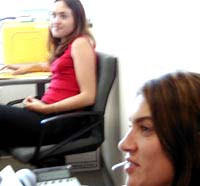 One
testament of the success that the Newsom campaign has experienced,
is in the signature gathering process. Any candidate can
secure the minimum signatures necessary to qualify for
a race. Basically this and the application fee gets you
in. The Newsom campaign however set an early goal of 20,000
signatures, but with one difference. They wanted the so
called "Hard Signatures". Anyone can drum up
a signature of a voter who agrees the candidate should
be on the ballot, but they may or may not vote for that
candidate. The Newsom people were after the signatures
of those voters who were going to vote for Newsom. A substantially
harder accomplishment. The goal of 20,000 was set in order
to beat the previous record, held by current Mayor Willie
Brown and political veteran, of 17,500 signatures. They
got over 23,000 hard signatures and a new record. One
testament of the success that the Newsom campaign has experienced,
is in the signature gathering process. Any candidate can
secure the minimum signatures necessary to qualify for
a race. Basically this and the application fee gets you
in. The Newsom campaign however set an early goal of 20,000
signatures, but with one difference. They wanted the so
called "Hard Signatures". Anyone can drum up
a signature of a voter who agrees the candidate should
be on the ballot, but they may or may not vote for that
candidate. The Newsom people were after the signatures
of those voters who were going to vote for Newsom. A substantially
harder accomplishment. The goal of 20,000 was set in order
to beat the previous record, held by current Mayor Willie
Brown and political veteran, of 17,500 signatures. They
got over 23,000 hard signatures and a new record.
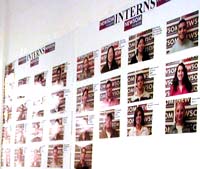 Part
of the success of the signature goal was thanks to the
efforts of Baha (Bahador) Hariri who took over the internship
program that Newsom had planned for. The program drafted
college students studying public policy as well as a diverse
range of other majors to come and intern for the campaign
during the summer. Baha was able to recruit some of the
highest caliber interns who brought not only a high degree
of expertise to the campaign, but an incredibly diverse
and enthusiastic energy that has contributed to the campaign's
overwhelming success so far. We're talking interns from
some of the best schools in the US. Part
of the success of the signature goal was thanks to the
efforts of Baha (Bahador) Hariri who took over the internship
program that Newsom had planned for. The program drafted
college students studying public policy as well as a diverse
range of other majors to come and intern for the campaign
during the summer. Baha was able to recruit some of the
highest caliber interns who brought not only a high degree
of expertise to the campaign, but an incredibly diverse
and enthusiastic energy that has contributed to the campaign's
overwhelming success so far. We're talking interns from
some of the best schools in the US.
This largely in part because Baha himself is finishing
his Masters of Public Policy when he returns to Harvard
in the fall.
 Baha,
younger (but taller) than Ahsha, was born in the US in
1980 and has been back to Iran once when he was 15. He
grew up in a traditional Iranian-living-in-the-US home,
taught to respect and cherish his roots. He is the quintessential
proud young Iranian, a bit tentative because he is young,
but clearly unafraid of anything. Why he is unafraid is
possibly due to the fact that he is (deep breath) Magna
Cum Laude and Phi Beta Kappa from Berkeley, he has worked
for California Senator Barbara Boxer, and he is now the
only Iranian in his class at the John F. Kennedy School
of Government at Harvard no less, and the Vice President
of the JFK School Student body. Baha,
younger (but taller) than Ahsha, was born in the US in
1980 and has been back to Iran once when he was 15. He
grew up in a traditional Iranian-living-in-the-US home,
taught to respect and cherish his roots. He is the quintessential
proud young Iranian, a bit tentative because he is young,
but clearly unafraid of anything. Why he is unafraid is
possibly due to the fact that he is (deep breath) Magna
Cum Laude and Phi Beta Kappa from Berkeley, he has worked
for California Senator Barbara Boxer, and he is now the
only Iranian in his class at the John F. Kennedy School
of Government at Harvard no less, and the Vice President
of the JFK School Student body.
So yes, these 2 guys are huge.
I asked Baha what he felt was an example of good strategy
in the Newsom campaign.
Baha: "Basically the approach here is to not take
anything for granted. We take it at the goal level. We
set small attainable goals and once we have achieved the
goal move on to the next one."
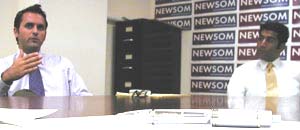 Ahsha: "Another
is that believe it or not this campaign hasn't promised
anything in return for votes. So the standard practice
of working with key community leaders and wooing them based
on their influence is not what we are about. There are
community leaders who are angry that we haven't gone to
them for help in the campaign. But we say vote for Newsom
if you think he is the best man for the job, not if you
expect favors." Ahsha: "Another
is that believe it or not this campaign hasn't promised
anything in return for votes. So the standard practice
of working with key community leaders and wooing them based
on their influence is not what we are about. There are
community leaders who are angry that we haven't gone to
them for help in the campaign. But we say vote for Newsom
if you think he is the best man for the job, not if you
expect favors."
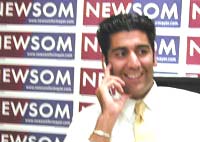 Baha: "Another
thing I like about Newsom is his commitment to "Best
Practices" solutions. Take a problem, find what is
the best practiced solution others have found for it and
implement it. It's simpler and better than the more common
political compromise approach." Baha: "Another
thing I like about Newsom is his commitment to "Best
Practices" solutions. Take a problem, find what is
the best practiced solution others have found for it and
implement it. It's simpler and better than the more common
political compromise approach."
 As
we walked around the office I was introduced to various
members of the staff and the volunteers who do everything
from make posters and banners, to call donors for money.
The Newsom campaign is about operational efficiency. Things
get done on time and are done well. The interns have been
an unusually successful part of the campaign and one aspect
is the proliferation of As
we walked around the office I was introduced to various
members of the staff and the volunteers who do everything
from make posters and banners, to call donors for money.
The Newsom campaign is about operational efficiency. Things
get done on time and are done well. The interns have been
an unusually successful part of the campaign and one aspect
is the proliferation of 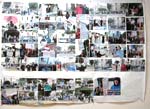 digital
cameras which has allowed the documentation of every major
event to be completely captured and recorded. This allows
Newsom to take many pictures with many voters and be able
to send them a signed thank you picture. Something that
goes a long way, and is a trademark of the personal touch
people feel when they talk to Newsom. digital
cameras which has allowed the documentation of every major
event to be completely captured and recorded. This allows
Newsom to take many pictures with many voters and be able
to send them a signed thank you picture. Something that
goes a long way, and is a trademark of the personal touch
people feel when they talk to Newsom.
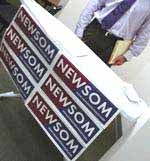 The
interns also use an ingenious device for getting signatures
and mobilizing themselves. They use an ironing board as
a standing table. It folds up quickly, is lightweight,
and they can move on to the next venue quickly. I think
it also adds a nice touch of grassroots symbolism which
people have obviously responded well to. The
interns also use an ingenious device for getting signatures
and mobilizing themselves. They use an ironing board as
a standing table. It folds up quickly, is lightweight,
and they can move on to the next venue quickly. I think
it also adds a nice touch of grassroots symbolism which
people have obviously responded well to.
All of this operational ingenuity and efficiency lends
itself to a healthy financial support base as well. Staffers
man the phones day in and out constantly trying to get
the donations of up to $500 per donor, the maximum allowed.
So far the campaign has very quickly raised 2 of their
set goal of 4 million dollars. The money is used for events,
and some staffers like Ahsha are paid. However, a majority
are unpaid volunteers.
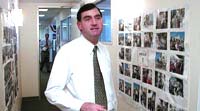 The
process is that based on whether the candidate wins or
not, as a staffer or volunteer, you may be invited to stay
on and hired. It's all based on honor, how well you work,
and whether you are right for the positions. Ahsha who
already has extensive experience in government, if Newsom
is elected, may well be given a job. Baha, although going
back to finish school, may also have a home when he is
done as well. Politics when it comes to this area is extremely
fluid and there are reasons for everything. The
process is that based on whether the candidate wins or
not, as a staffer or volunteer, you may be invited to stay
on and hired. It's all based on honor, how well you work,
and whether you are right for the positions. Ahsha who
already has extensive experience in government, if Newsom
is elected, may well be given a job. Baha, although going
back to finish school, may also have a home when he is
done as well. Politics when it comes to this area is extremely
fluid and there are reasons for everything.
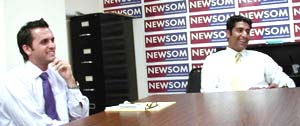
I asked them what they felt was possible for the Iranian-American
community based on their knowledge and experience and what
personal aspirations they have.
Ahsha: "We have to find a small point on which to
build consensus. That is the first step. It doesn't matter
what the point is. Look, Iranian-Americans don't have anymore
difficulties than other cultures do. It's about finding
the common areas of agreement and starting with that.My
goal is to help the Iranian-American community harness
our collective power so that we can control the direction
of our own political fate in this country."
Baha: "My goal is to kick down doors, and have other
Iranians follow."
 Then
I asked, "So why are you so involved? I mean, people
my age have spent the past 20 years trying to forget being
an Iranian and get on with their lives, hard as it has
been to do so. But what is it about being an Iranian that
is so important to you?" Then
I asked, "So why are you so involved? I mean, people
my age have spent the past 20 years trying to forget being
an Iranian and get on with their lives, hard as it has
been to do so. But what is it about being an Iranian that
is so important to you?"
Ahsha: "I once read somewhere that "what the
father chooses to forget, the son chooses to remember".
I am very proud of being an Iranian-American and I can't
imagine not being proud of who I am."
Then the $64,000 question, "What could we have done
about the Feinstein bill?"
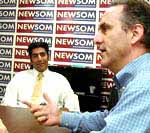 Ahsha: " Had
we been better organized, the bill would never have seen
the light of day. With the strength of our community in
California, we never should have allowed a bill that directly
targets Iranians to happen." Ahsha: " Had
we been better organized, the bill would never have seen
the light of day. With the strength of our community in
California, we never should have allowed a bill that directly
targets Iranians to happen."
And finally, "What is your secret of success?"
Ahsha: "I have absolutely no interest in getting
credit for my efforts in helping a campaign or fighting
for something."
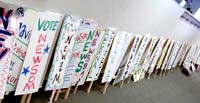 Baha: "You
have to want to work hard to fix something." Baha: "You
have to want to work hard to fix something."
We stopped. I thanked them for their time. As I left the
office and walking back to my truck, could not help but
wonder where these two incredible young men were headed
and what their futures would hold.
I will be watching them with interest. I suggest we all
do.
|

 This
dilemma has kept many of my generation from actively
participating in the American political process. Having
gone through the 80's and the hostage crisis, we were
justifiably scared away from anything that would bring
up that ugly chapter of our history. We strived to keep
the topic of the discussions with our American friends
away from anything to do with Iran, if we had any American
friends at all. We kept neighbors at a distance, and
retreated to the comfort of Iranian restaurants for lunch
on Fridays where we could forget, for a brief moment.
This
dilemma has kept many of my generation from actively
participating in the American political process. Having
gone through the 80's and the hostage crisis, we were
justifiably scared away from anything that would bring
up that ugly chapter of our history. We strived to keep
the topic of the discussions with our American friends
away from anything to do with Iran, if we had any American
friends at all. We kept neighbors at a distance, and
retreated to the comfort of Iranian restaurants for lunch
on Fridays where we could forget, for a brief moment. But
things are starting to change. After 9/11 we have become
more vocal. We're starting to come out of our collective
shells, the discussions are getting more heated and we
are engaging our American friends more as they start
to "get it". Now state and local senators
are taking more meetings with Iranian advocacy groups
that are popping up on both coasts.
But
things are starting to change. After 9/11 we have become
more vocal. We're starting to come out of our collective
shells, the discussions are getting more heated and we
are engaging our American friends more as they start
to "get it". Now state and local senators
are taking more meetings with Iranian advocacy groups
that are popping up on both coasts. Case
in point, in this year's San Francisco mayor's race,
the leading candidate Supervisor Gavin Newsom who is
running an unbelievably successful campaign (dast-be
choob! trans; touch wood) has not one, but 2 Iranian
staffers. Ahsha-Ali Safai, and Baha (Bahador) Hariri,
as you will read, are two of the brightest stars, well-equipped
and outfitted, ready and willing to take on the challenges
the future will likely try to throw at them. They are
definitely two to watch. I recently met them at the Newsom
campaign headquarters in downtown San Francisco.
Case
in point, in this year's San Francisco mayor's race,
the leading candidate Supervisor Gavin Newsom who is
running an unbelievably successful campaign (dast-be
choob! trans; touch wood) has not one, but 2 Iranian
staffers. Ahsha-Ali Safai, and Baha (Bahador) Hariri,
as you will read, are two of the brightest stars, well-equipped
and outfitted, ready and willing to take on the challenges
the future will likely try to throw at them. They are
definitely two to watch. I recently met them at the Newsom
campaign headquarters in downtown San Francisco. A
bit of background on Ahsha. Born in Iran in 1973 he is
an American Citizen and has been involved with politics
since age 18. He looks, walks, talks and is every bit reminiscent
of a hipper, cooler George Stephanopolis. Except he is
better looking (because he is Iranian!). During college
at Northeastern he worked in Massachusetts politics at
the city and state level, establishing many mentor level
contacts with big name politicians such as former presidential
candidate Dukakis. In 1995 after completing his undergrad
he went to work in the Clinton White House. When that term
was complete he went back to college, this time to MIT,
where he received his masters in Urban Studies and City
Planning.
A
bit of background on Ahsha. Born in Iran in 1973 he is
an American Citizen and has been involved with politics
since age 18. He looks, walks, talks and is every bit reminiscent
of a hipper, cooler George Stephanopolis. Except he is
better looking (because he is Iranian!). During college
at Northeastern he worked in Massachusetts politics at
the city and state level, establishing many mentor level
contacts with big name politicians such as former presidential
candidate Dukakis. In 1995 after completing his undergrad
he went to work in the Clinton White House. When that term
was complete he went back to college, this time to MIT,
where he received his masters in Urban Studies and City
Planning. In
2000 he moved to San Francisco and immediately went to
work for the Housing Authority. His function, unclog proposals
and budget approvals and laws that were stuck in the system.
Basically a swiss army knife. Find out why something is
stuck, and go get it fixed. This involved frequent meetings
with city council members and supervisors in order to advocate
and educate and explain the benefits and reasons why an
initiative was good and why they should pass it and get
it going.
In
2000 he moved to San Francisco and immediately went to
work for the Housing Authority. His function, unclog proposals
and budget approvals and laws that were stuck in the system.
Basically a swiss army knife. Find out why something is
stuck, and go get it fixed. This involved frequent meetings
with city council members and supervisors in order to advocate
and educate and explain the benefits and reasons why an
initiative was good and why they should pass it and get
it going. It
was through this job that he met with and grew to respect
Gavin Newsom. When it became clear that Newsom was going
to run for Mayor, Ahsha joined the campaign as Deputy Field
Director. This function essentially mobilizes the supporters
for the candidate and coordinates activities in order to
maximize exposure, and help the candidate meet and interact
with as many people as possible.
It
was through this job that he met with and grew to respect
Gavin Newsom. When it became clear that Newsom was going
to run for Mayor, Ahsha joined the campaign as Deputy Field
Director. This function essentially mobilizes the supporters
for the candidate and coordinates activities in order to
maximize exposure, and help the candidate meet and interact
with as many people as possible. Gavin
Newsom is somewhat of an enigma himself. He has come from
the best San Francisco has to offer. A local restaurant
and wine businessman, he has a well qualified awareness
of both the internal needs of the city as well as the important
image San Francisco has, as one of the top ranked cities
in the world. However, San Francisco has it's fair share
of problems that you can tell Newsom intends to tackle
with energy.
Gavin
Newsom is somewhat of an enigma himself. He has come from
the best San Francisco has to offer. A local restaurant
and wine businessman, he has a well qualified awareness
of both the internal needs of the city as well as the important
image San Francisco has, as one of the top ranked cities
in the world. However, San Francisco has it's fair share
of problems that you can tell Newsom intends to tackle
with energy. One
testament of the success that the Newsom campaign has experienced,
is in the signature gathering process. Any candidate can
secure the minimum signatures necessary to qualify for
a race. Basically this and the application fee gets you
in. The Newsom campaign however set an early goal of 20,000
signatures, but with one difference. They wanted the so
called "Hard Signatures". Anyone can drum up
a signature of a voter who agrees the candidate should
be on the ballot, but they may or may not vote for that
candidate. The Newsom people were after the signatures
of those voters who were going to vote for Newsom. A substantially
harder accomplishment. The goal of 20,000 was set in order
to beat the previous record, held by current Mayor Willie
Brown and political veteran, of 17,500 signatures. They
got over 23,000 hard signatures and a new record.
One
testament of the success that the Newsom campaign has experienced,
is in the signature gathering process. Any candidate can
secure the minimum signatures necessary to qualify for
a race. Basically this and the application fee gets you
in. The Newsom campaign however set an early goal of 20,000
signatures, but with one difference. They wanted the so
called "Hard Signatures". Anyone can drum up
a signature of a voter who agrees the candidate should
be on the ballot, but they may or may not vote for that
candidate. The Newsom people were after the signatures
of those voters who were going to vote for Newsom. A substantially
harder accomplishment. The goal of 20,000 was set in order
to beat the previous record, held by current Mayor Willie
Brown and political veteran, of 17,500 signatures. They
got over 23,000 hard signatures and a new record. Part
of the success of the signature goal was thanks to the
efforts of Baha (Bahador) Hariri who took over the internship
program that Newsom had planned for. The program drafted
college students studying public policy as well as a diverse
range of other majors to come and intern for the campaign
during the summer. Baha was able to recruit some of the
highest caliber interns who brought not only a high degree
of expertise to the campaign, but an incredibly diverse
and enthusiastic energy that has contributed to the campaign's
overwhelming success so far. We're talking interns from
some of the best schools in the US.
Part
of the success of the signature goal was thanks to the
efforts of Baha (Bahador) Hariri who took over the internship
program that Newsom had planned for. The program drafted
college students studying public policy as well as a diverse
range of other majors to come and intern for the campaign
during the summer. Baha was able to recruit some of the
highest caliber interns who brought not only a high degree
of expertise to the campaign, but an incredibly diverse
and enthusiastic energy that has contributed to the campaign's
overwhelming success so far. We're talking interns from
some of the best schools in the US. Baha,
younger (but taller) than Ahsha, was born in the US in
1980 and has been back to Iran once when he was 15. He
grew up in a traditional Iranian-living-in-the-US home,
taught to respect and cherish his roots. He is the quintessential
proud young Iranian, a bit tentative because he is young,
but clearly unafraid of anything. Why he is unafraid is
possibly due to the fact that he is (deep breath) Magna
Cum Laude and Phi Beta Kappa from Berkeley, he has worked
for California Senator Barbara Boxer, and he is now the
only Iranian in his class at the John F. Kennedy School
of Government at Harvard no less, and the Vice President
of the JFK School Student body.
Baha,
younger (but taller) than Ahsha, was born in the US in
1980 and has been back to Iran once when he was 15. He
grew up in a traditional Iranian-living-in-the-US home,
taught to respect and cherish his roots. He is the quintessential
proud young Iranian, a bit tentative because he is young,
but clearly unafraid of anything. Why he is unafraid is
possibly due to the fact that he is (deep breath) Magna
Cum Laude and Phi Beta Kappa from Berkeley, he has worked
for California Senator Barbara Boxer, and he is now the
only Iranian in his class at the John F. Kennedy School
of Government at Harvard no less, and the Vice President
of the JFK School Student body. Ahsha: "Another
is that believe it or not this campaign hasn't promised
anything in return for votes. So the standard practice
of working with key community leaders and wooing them based
on their influence is not what we are about. There are
community leaders who are angry that we haven't gone to
them for help in the campaign. But we say vote for Newsom
if you think he is the best man for the job, not if you
expect favors."
Ahsha: "Another
is that believe it or not this campaign hasn't promised
anything in return for votes. So the standard practice
of working with key community leaders and wooing them based
on their influence is not what we are about. There are
community leaders who are angry that we haven't gone to
them for help in the campaign. But we say vote for Newsom
if you think he is the best man for the job, not if you
expect favors." Baha: "Another
thing I like about Newsom is his commitment to "Best
Practices" solutions. Take a problem, find what is
the best practiced solution others have found for it and
implement it. It's simpler and better than the more common
political compromise approach."
Baha: "Another
thing I like about Newsom is his commitment to "Best
Practices" solutions. Take a problem, find what is
the best practiced solution others have found for it and
implement it. It's simpler and better than the more common
political compromise approach." As
we walked around the office I was introduced to various
members of the staff and the volunteers who do everything
from make posters and banners, to call donors for money.
The Newsom campaign is about operational efficiency. Things
get done on time and are done well. The interns have been
an unusually successful part of the campaign and one aspect
is the proliferation of
As
we walked around the office I was introduced to various
members of the staff and the volunteers who do everything
from make posters and banners, to call donors for money.
The Newsom campaign is about operational efficiency. Things
get done on time and are done well. The interns have been
an unusually successful part of the campaign and one aspect
is the proliferation of  digital
cameras which has allowed the documentation of every major
event to be completely captured and recorded. This allows
Newsom to take many pictures with many voters and be able
to send them a signed thank you picture. Something that
goes a long way, and is a trademark of the personal touch
people feel when they talk to Newsom.
digital
cameras which has allowed the documentation of every major
event to be completely captured and recorded. This allows
Newsom to take many pictures with many voters and be able
to send them a signed thank you picture. Something that
goes a long way, and is a trademark of the personal touch
people feel when they talk to Newsom. The
interns also use an ingenious device for getting signatures
and mobilizing themselves. They use an ironing board as
a standing table. It folds up quickly, is lightweight,
and they can move on to the next venue quickly. I think
it also adds a nice touch of grassroots symbolism which
people have obviously responded well to.
The
interns also use an ingenious device for getting signatures
and mobilizing themselves. They use an ironing board as
a standing table. It folds up quickly, is lightweight,
and they can move on to the next venue quickly. I think
it also adds a nice touch of grassroots symbolism which
people have obviously responded well to. The
process is that based on whether the candidate wins or
not, as a staffer or volunteer, you may be invited to stay
on and hired. It's all based on honor, how well you work,
and whether you are right for the positions. Ahsha who
already has extensive experience in government, if Newsom
is elected, may well be given a job. Baha, although going
back to finish school, may also have a home when he is
done as well. Politics when it comes to this area is extremely
fluid and there are reasons for everything.
The
process is that based on whether the candidate wins or
not, as a staffer or volunteer, you may be invited to stay
on and hired. It's all based on honor, how well you work,
and whether you are right for the positions. Ahsha who
already has extensive experience in government, if Newsom
is elected, may well be given a job. Baha, although going
back to finish school, may also have a home when he is
done as well. Politics when it comes to this area is extremely
fluid and there are reasons for everything.
 Then
I asked, "So why are you so involved? I mean, people
my age have spent the past 20 years trying to forget being
an Iranian and get on with their lives, hard as it has
been to do so. But what is it about being an Iranian that
is so important to you?"
Then
I asked, "So why are you so involved? I mean, people
my age have spent the past 20 years trying to forget being
an Iranian and get on with their lives, hard as it has
been to do so. But what is it about being an Iranian that
is so important to you?" Ahsha: " Had
we been better organized, the bill would never have seen
the light of day. With the strength of our community in
California, we never should have allowed a bill that directly
targets Iranians to happen."
Ahsha: " Had
we been better organized, the bill would never have seen
the light of day. With the strength of our community in
California, we never should have allowed a bill that directly
targets Iranians to happen." Baha: "You
have to want to work hard to fix something."
Baha: "You
have to want to work hard to fix something."

